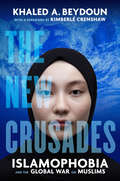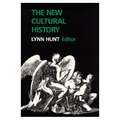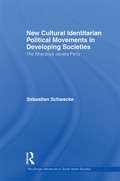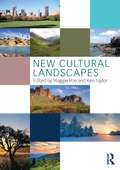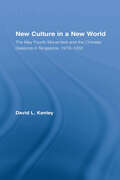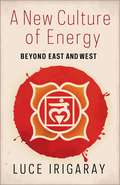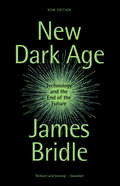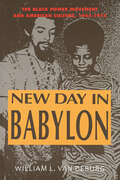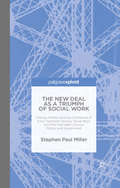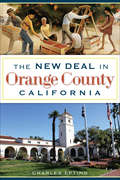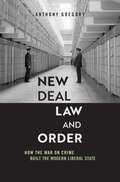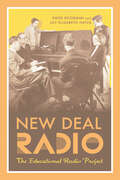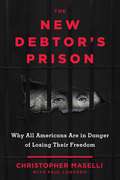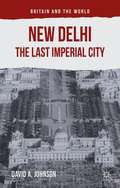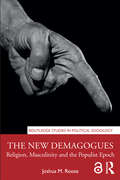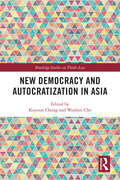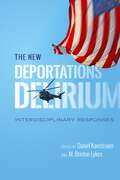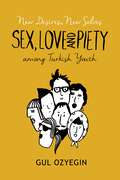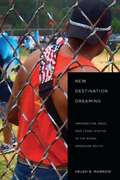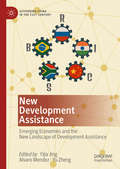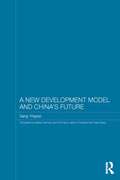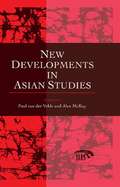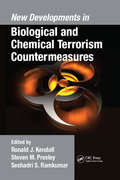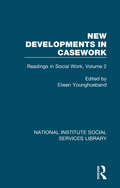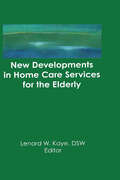- Table View
- List View
The New Crusades: Islamophobia and the Global War on Muslims
by Khaled A. Beydoun"The New Crusades is an intersectional milestone. It lucidly illustrates how converging systems of subordination, power, and violence related to Islamophobia are experienced across the globe."—Kimberlé Crenshaw, from the foreword The first book to examine global Islamophobia from a legal and ground-up perspective, from renowned public intellectual Khaled A. Beydoun. Islamophobia has spiraled into a global menace, and democratic and authoritarian regimes alike have deployed it as a strategy to persecute their Muslim populations. With this book, Khaled A. Beydoun details how the American War on Terror has facilitated and intensified the network of anti-Muslim campaigns unfolding across the world. The New Crusades is the first book of its kind, offering a critical and intimate examination of global Islamophobia and its manifestations in Europe, Asia, the Middle East, and regions beyond and in between. Through trenchant analysis and direct testimony from Muslims on the ground, Beydoun interrogates how Islamophobia acts as a unifying global thread of state and social bigotry, instigating both liberal and right-wing hate-mongering. Whether imposed by way of hijab bans in France, state-sponsored hate speech and violence in India, or the network of concentration camps in China, Islamophobia unravels into distinct systems of demonization and oppression across the post-9/11 geopolitical landscape. Lucid and poignant, The New Crusades reveals that Islamophobia is not only a worldwide phenomenon—it stands as one of the world's last bastions of acceptable hate.
The New Cultural History
by Lynn HuntAcross the humanities and the social sciences, disciplinary boundaries have come into question as scholars have acknowledged their common preoccupations with cultural phenomena ranging from rituals and ceremonies to texts and discourse. Literary critics, for example, have turned to history for a deepening of their notion of cultural products; some of them now read historical documents in the same way that they previously read "great" texts. Anthropologists have turned to the history of their own discipline in order to better understand the ways in which disciplinary authority was constructed. As historians have begun to participate in this ferment, they have moved away from their earlier focus on social theoretical models of historical development toward concepts taken from cultural anthropology and literary criticism. Much of the most exciting work in history recently has been affiliated with this wide-ranging effort to write history that is essentially a history of culture. The essays presented here provide an introduction to this movement within the discipline of history. The essays in Part One trace the influence of important models for the new cultural history, models ranging from the path breaking work of the French cultural critic Michel Foucault and the American anthropologist Clifford Geertz to the imaginative efforts of such contemporary historians as Natalie Davis and E. P. Thompson, as well as the more controversial theories of Hayden White and Dominick LaCapra. The essays in Part Two are exemplary of the most challenging and fruitful new work of historians in this genre, with topics as diverse as parades in 19th-century America, 16th-century Spanish texts, English medical writing, and the visual practices implied in Italian Renaissance frescoes. Beneath this diversity, however, it is possible to see the commonalities of the new cultural history as it takes shape. Students, teachers, and general readers interested in the future of history will find these essays stimulating and provocative.
New Cultural Identitarian Political Movements in Developing Societies: The Bharatiya Janata Party (Routledge Advances in South Asian Studies)
by Sebastian SchweckeApplying an intercultural and comparative theoretical approach across Asia and Africa, this book analyses the rise and moderation of political movements in developing societies which mobilise popular support with references to conceptions of cultural identity. The author includes not only the Hindu nationalist movement but also many Islamist political movements in a single category – New Cultural Identitarian Political Movements (NCIPM). Demonstrating significant similarities in the pattern of evolution between these and European Christian Democracy, the book provides an instrument for the analysis of these movements outside the parameters of the fundamentalism debate. The book looks at a number of key variables for understanding the evolution of NCIPM, and it goes on to analyse the transition of developing societies from rent-based political economies to capitalism and the (partial) failure of this transition process. It argues that there is a need to incorporate economic and class analysis in the study of political processes in developing societies against the continuing emphasis on cultural factors associated with the "cultural turn" of social sciences. The book is an interesting contribution to studies in South Asian Politics, as well as Comparative Politics.
New Cultural Landscapes: Challenges And New Directions
by Maggie Roe Ken TaylorWhile historical and protected landscapes have been well studied for years, the cultural significance of ordinary landscapes is now increasingly recognised. This groundbreaking book discusses how contemporary cultural landscapes can be, and are, created and recognised. The book challenges common concepts of cultural landscapes as protected or ‘special’ landscapes that include significant buildings or features. Using case studies from around the world it questions the usual measures of judgement related to cultural landscapes and instead focuses on landscapes that are created, planned or simply evolve as a result of changing human cultures, management policy and practice. Each contribution analyses the geographical and human background of the landscape, and policies and management strategies that impact upon it, and defines the meanings of 'cultural landscape' in its particular context. Taken together they establish a new paradigm in the study of landscapes in all forms.
New Culture in a New World: The May Fourth Movement and the Chinese Diaspora in Singapore, 1919-1932
by David KenleyDuring the 1920s, China's intellectuals called for a new literature, a new system of thought and new orientation towards modern life. Commonly known as the May Fourth Movement or the New Culture Movement, this intellectual momentum spilled beyond China into the overseas Chinese communities. This work analyzes the New Culture Movement from a diaspora perspective, namely that of the overseas Chinese in Singapore. Because they were members of a diaspora, the Chinese in Singapore first had to imagine themselves as part of the Chinese nation before they could fully participate in the movement. Also, Singapore's new culture advocates adopted then amended the movement's basic ideas to fit their situation. This work furthers our understanding of transnationalism and reminds us that in our rush to deconstruct the nation we should remember the discursive power of nationalism as it both enhances and restricts the authority of its advocates.
A New Culture of Energy: Beyond East and West
by Luce IrigarayIn A New Culture of Energy, Luce Irigaray reflects on three critical concerns of our time: the cultivation of energy in its many forms, the integration of Asian and Western traditions, and the reenvisioning of religious figures for the contemporary world. A philosopher as well as a psychoanalyst, Irigaray draws deeply on her personal experience in addressing these questions. In her view, although psychoanalysis can succeed in releasing mental energy, it fails to support physical and spiritual well-being. In pursuit of an alternative, she took up the bodily practices of yoga and pranayama breathing, which she considers in light of her analysis of sexuate belonging and difference. Reflecting on these practices, Irigaray contrasts yoga’s approach to the natural world with how the Western tradition privileges mastery over nature. These varied sources provoke her to question how a tradition imagines transcendence and the divine. In the book’s final section, she reinterprets the figure of Mary through breath, self-affection, and touch, recalibrating her physicality within a natural world. A reflection on the liberation of human energy, this book urges us to cultivate an evolutionary culture in harmony with all living beings.
New Dark Age: Technology and the End of the Future
by James BridleAs the world around us increases in technological complexity, our understanding of it diminishes. Underlying this trend is a single idea: the belief that our existence is understandable through computation, and more data is enough to help us build a better world. In actual fact, we are lost in a sea of information, increasingly divided by fundamentalism, simplistic narratives, conspiracy theories, and post-factual politics. Meanwhile, those in power use our lack of understanding to further their own interests. Despite the accessibility of information, we’re living in a new Dark Age. From rogue financial systems to shopping algorithms, from artificial intelligence to state secrecy, we no longer understand how our world is governed or presented to us. The media is filled with unverifiable speculation, much of it generated by anonymous software, while companies dominate their employees through surveillance and the threat of automation. In his brilliant new work, leading artist and writer James Bridle excavates the limits of technology and how it aids our understanding of the world. Surveying the history of art, technology, and information systems, he explores the dark clouds that gather over our dreams of the digital sublime.
New Day in Babylon: he Black Power Movement and American Culture, 1965–1975
by William L. Van DeburgThe most comprehensive account available of the rise and fall of the Black Power Movement and of its dramatic transformation of both African-American and larger American culture. With a gift for storytelling and an ear for street talk, William Van Deburg chronicles a decade of deep change, from the armed struggles of the Black Panther party to the cultural nationalism of artists and writers creating a new aesthetic. Van Deburg contends that although its tactical gains were sometimes short-lived, the Black Power movement did succeed in making a revolution—one in culture and consciousness—that has changed the context of race in America. "New Day in Babylon is an extremely intelligent synthesis, a densely textured evocation of one of American history's most revolutionary transformations in ethnic group consciousness."—Bob Blauner, New York Times Winner of the Gustavus Myers Center Outstanding Book Award, 1993
The New Deal as a Triumph of Social Work: Frances Perkins and the Confluence of Early Twentieth Century Social Work with Mid-Twentieth Century Politics and Government
by S. MillerThe New Deal as a Triumph of Social Work concerns the 'hand' the New Deal plays from the perspective of early American History in which government and business cooperation is assumed and economic rights are addressed collectively whereas political rights are considered individually. The New Deal reconfigures this 'ratio' of rights by folding 'social work' into the aims of government. Miller describes the vital part Frances Perkins and her personal history play in this development.
The New Deal in Orange County, California
by Charles EptingThis historical tour explores how FDR&’s domestic programs helped revitalize a region devastated by natural disasters and the Great Depression. While many people are familiar with the New Deal&’s sweeping initiatives, few have a nuanced sense of what this &“alphabet soup&” of organizations actually did on a local level. In this fascinating book, historian Christopher Epting looks at the various New Deal projects undertaken in Orange County, showing how they met the myriad needs of its struggling communities. Unpredictably harsh elements wreaked havoc in Orange County during the Great Depression. The Long Beach earthquake of 1933 and the 1938 Santa Ana River flood took numerous lives, decimated buildings and destroyed much of the county's namesake citrus industry. In response, Orange County received federal public aid through the Works Progress Administration, Civilian Conservation Corps and other agencies. Epting reveals their efforts in this tour of the buildings, bridges, harbors, trails, libraries, highways and other infrastructure gains—many still in use—that were revitalized by President Roosevelt&’s New Deal.
New Deal Law and Order: How the War on Crime Built the Modern Liberal State
by Anthony GregoryA historian traces the origins of the modern law-and-order state to a surprising source: the liberal policies of the New Deal.Most Americans remember the New Deal as the crucible of modern liberalism. But while it is most closely associated with Roosevelt’s efforts to end the Depression and provide social security for the elderly, we have failed to acknowledge one of its most enduring legacies: its war on crime. Crime policy, Anthony Gregory argues, was a defining feature of the New Deal. Tough-on-crime policies provided both the philosophical underpinnings and the institutional legitimacy necessary to remake the American state.New Deal Law and Order follows President Franklin Roosevelt, Attorney General Homer Cummings, and their war on crime coalition, which overcame the institutional and political challenges to the legitimacy of national law enforcement. Promises of law and order helped to manage tensions among key Democratic Party factions—organized labor, Black Americans, and white Southerners. Their anticrime program, featuring a strengthened criminal code, an empowered FBI, and the first federal war on marijuana, was essential to the expansion of national authority previously stymied on constitutional grounds. This nascent carceral liberalism both accommodated a redoubled emphasis on rehabilitation and underwrote a massive wave of prison construction across the country. Alcatraz, an unforgiving punitive model, was designed to be a “symbol of the triumph of law and order.” This emergent security state eventually transformed both liberalism and federalism, and in the process reoriented the terms of US political debate for decades to come.
New Deal Radio: The Educational Radio Project
by David Goodman Joy Elizabeth HayesNew Deal Radio examines the federal government's involvement in broadcasting during the New Deal period, looking at the U.S. Office of Education's Educational Radio Project. The fact that the United States never developed a national public broadcaster, has remained a central problem of US broadcasting history. Rather than ponder what might have been, authors Joy Hayes and David Goodman look at what did happen. There was in fact a great deal of government involvement in broadcasting in the US before 1945 at local, state, and federal levels. Among the federal agencies on the air were the Department of Agriculture, the National Park Service, the Works Progress Administration (WPA) and the Federal Theatre Project. Contextualizing the different series aired by the Educational Radio Project as part of a unified project about radio and citizenship is crucial to understanding them. New Deal Radio argues that this distinctive government commercial partnership amounted to a critical intervention in US broadcasting and an important chapter in the evolution of public radio in America.
The New Debtors' Prison: Why All Americans Are in Danger of Losing Their Freedom
by Paul Lonardo Christopher B. MaselliDebtors’ prisons might sound like something out of a Dickens novel, but what most Americans do not realize is that they are alive and well in a new and startling form. Today more than 20 percent of the prison population is incarcerated for financial reasons such as failing to pay a fine. This alarming trend not only affects the poor, who are hit particularly hard, but also ensnares the millions of self-identified middle-class people who are struggling to make ends meet. All across the country people are being fined and even imprisoned for offenses as small as delinquency on student debt or an unpaid parking ticket. However, there is an insidious undercurrent to these practices that the average person might not realize. Many counties depend on a steady supply of citizens to pay fines and court costs in order to make their budgets. Minor vehicle infractions, by design, can rack up hundreds of dollars in charges that go straight to the city’s coffers. Combine this with the fact that many middle-class people cannot handle an unexpected $400 expense and the general lack of awareness about the risk for being repeatedly jailed for failure to pay court costs, probation, and even per day charges for being in jail and you get an endless cycle of men and women either in debt or in prison for debt. While shocking to some, this system makes up today’s debtors’ prisons. In The New Debtors’ Prison, Christopher Maselli draws from his personal knowledge of the criminal justice system based on his experience on both sides of the prison walls as an attorney as well as a former inmate, to take a hard look at our modern prison system that systematically targets the poor and vulnerable of our society in order to fund the prison-industrial complex.
New Delhi: The Last Imperial City
by David A. JohnsonJohnson provides an historically rich examination of the intersection of early twentieth-century imperial culture, imperial politics, and imperial economics as reflected in the colonial built environment at New Delhi, a remarkably ambitious imperial capital built by the British between 1911 and 1931.
The New Demagogues: Religion, Masculinity and the Populist Epoch (Routledge Studies in Political Sociology)
by Joshua M. RooseFocused on the emergence of US President Donald Trump, the United Kingdom’s departure from the European Union, and the recruitment of Islamic State foreign fighters from Western Muslim communities, this book explores the ways in which the decay and corruption of key social institutions has created a vacuum of intellectual and moral guidance for working people and deprived them of hope and an upward social mobility long considered central to the social contract of Western liberal democracy. Examining the exploitation of this vacuum of leadership and opportunity by new demagogues, the author considers two important yet overlooked dimensions of this new populism: the mobilization of both religion and masculinity. By understanding religion as a dynamic social force that can be mobilized for purposes of social solidarity and by appreciating the sociological arguments that hyper-masculinity is caused by social injury, Roose considers how these key social factors have been particularly important in contributing to the emergence of the new demagogues and their followers. Roose identifies the challenges that this poses for Western liberal democracy and argues that states must look beyond identity politics and exclusively rights-based claims and, instead, consider classical conceptions of citizenship.
New Democracy and Autocratization in Asia (Routledge Studies on Think Asia)
by Kuyoun Chung and Wonbin ChoThis book examines the quality of democracies in Asia and determines why current democracies—especially during the so-called “new normal” era following the 2008 financial crisis—have become less stable and less resilient to increasing authoritarianism. Based on the assumption that the concept of democracy consists of three elements—procedure (participation, competition, and distribution of power); effectiveness (representation, accountability, and responsiveness); and performance (social welfare, inequality, and trust)—the contributors to this book determine which elements are responsible for diverging trajectories within the Asian democratic recession. Examining South Korea, Japan, Taiwan, Singapore, Vietnam, Indonesia, India, Myanmar, and China, the authors employ different research methods—quantitative, comparative, or individual case studies—to explore the conditions under which democratic rules and norms erode over time, and which type of governance is preferred by citizens in this region as an ideal type. The book puts forward the argument that a procedure-oriented concept of democracy is not sufficient for understanding the source of democratic recession and develops a new concept of “new democracy” based on procedure, effectiveness, and performance. It also demonstrates to what extent the experience changes and how the countries respond to these changes. A novel contribution on the state of democracy in Asia written by experts from the region, this book will be of interest to academics in the field of political science, especially comparative politics and international relations, regional study of East and Southeast Asia, sociology, public policy, economics, and social science methods. Also, this book will appeal to think tanks and policy-oriented researchers.
The New Deportations Delirium: Interdisciplinary Responses (Citizenship and Migration in the Americas #7)
by Daniel Kanstroom M. Brinton LykesSince 1996, when the deportation laws were hardened, millions of migrants to the U.S., including many long-term legal permanent residents with “green cards,” have experienced summary arrest, incarceration without bail, transfer to remote detention facilities, and deportation without counsel—a life-time banishment from what is, in many cases, the only country they have ever known. U.S.-based families and communities face the loss of a worker, neighbor, spouse, parent, or child. Many of the deported are “sentenced home” to a country which they only knew as an infant, whose language they do not speak, or where a family lives in extreme poverty or indebtedness for not yet being able to pay the costs of their previous migration. But what does this actually look like and what are the systems and processes and who are the people who are enforcing deportation policies and practices? The New Deportations Delirium responds to these questions.Taken as a whole, the volume raises consciousness about the complexities of the issues and argues for the interdisciplinary dialogue and response. Over the course of the book, deportation policy is debated by lawyers, judges, social workers, researchers, and clinical and community psychologists as well as educators, researchers, and community activists. The New Deportations Delirium presents a fresh conversation and urges a holistic response to the complex realities facing not only migrants but also the wider U.S. society in which they have sought a better life.
New Desires, New Selves: Sex, Love, and Piety among Turkish Youth
by Gul OzyeginAs Turkey pushes for its place in the global pecking order and embraces neoliberal capitalism, the nation has seen a period of unprecedented shifts in political, religious, and gender and sexual identities for its citizens. In New Desires, New Selves, Gul Ozyegin shows how this social transformation in Turkey is felt most strongly among its young people, eager to surrender to the seduction of sexual modernity, but also longing to remain attached to traditional social relations, identities and histories. Engaging a wide array of upwardly-mobile young adults at a major Turkish university, Ozyegin links the biographies of individuals with the biography of a nation, revealing their creation of conflicted identities in a country which has existed uneasily between West and East, modern and traditional, and secular and Islamic. For these young people, sexuality, gender expression, and intimate relationships in particular serve as key sites for reproducing and challenging patriarchy and paternalism that was hallmark of earlier generations. As Ozyegin evocatively shows, the quest for sexual freedom and an escape from patriarchal constructions of selfless femininity and protective masculinity promise both personal transformations and profound sexual guilt and anxiety. A poignant and original study, New Desires, New Selves presents a snapshot of cultural change on the eve of rapid globalization in the Muslim world.
New Destination Dreaming
by Helen B. MarrowNew York, Chicago, and Los Angeles have long been shaped by immigration. These gateway cities have traditionally been assumed to be the major flashpoints in American debates over immigration policy—but the reality on the ground is proving different. Since the 1980s, new immigrants have increasingly settled in rural and suburban areas, particularly within the South. Couple this demographic change with an increase in unauthorized immigrants, and the rural South, once perhaps the most culturally and racially "settled" part of the country, now offers a window into the changing dynamics of immigration and, more generally, the changing face of America. New Destination Dreaming explores how the rural context impacts the immigrant experience, how rapid Hispanic immigration influences southern race relations, and how institutions like schools and law enforcement agencies deal with unauthorized residents. Though the South is assumed to be an economically depressed region, low-wage food processing jobs are offering Hispanic newcomers the opportunity to carve out a living and join the rural working class, though this is not without its problems. Inattention from politicians to this growing population and rising black-brown tensions are both factors in contemporary rural southern life. Ultimately, Marrow presents a cautiously optimistic view of Hispanic newcomers' opportunities for upward mobility in the rural South, while underscoring the threat of anti-immigrant sentiment and restrictive policymaking that has gripped the region in recent years. Lack of citizenship and legal status still threatens many Hispanic newcomers' opportunities. This book uncovers what more we can do to ensure that America's newest residents become productive and integrated members of rural southern society rather than a newly excluded underclass.
New Development Assistance: Emerging Economies and the New Landscape of Development Assistance (Governing China in the 21st Century)
by Yu Zheng Yijia Jing Alvaro MendezThis book explores the changing face of development assistance. China's One Belt, One Road development program is the largest international investment scheme in history, surpassing the Marshall Plan by an order of magnitude. In 2017, a group of top scholars from Fudan, the London School of Economics, and other institutions like the Institute of Development Studies, Australian National University, and World Bank gathered to share findings and ideas about the nature of New Development Assistance. A compilation of their findings, this book will be of interest to NGOs, policymakers, and academics.
A New Development Model and China's Future (Routledge Studies on the Chinese Economy)
by Deng YingtaoThe need for China to find a new, environmentally sustainable development path is accepted widely among Chinese scholars and policy makers. This book makes available for the first time to an English–speaking audience Deng Yingtao's ground-breaking book New Development Model and China’s Future. Published in 1991, the book was far ahead of its time. Deng subjects the development model of the high income countries to rigorous analysis and explores the environmental implications of China following this model. His clear conclusion is that the carrying capacity of the physical environment and nature is limited, that economic and social development should not exceed the carrying capacity of resources, and that China should not adopt the western development path. Based on insights from economics, engineering and human psychology, the book analyses the environmental impact of the current western development model, demonstrates the catastrophic impact this would have in terms of China's own development and in terms of China's relationship with the world, and argues that China's rich intellectual and scientific tradition will allow Chinese people to play a central role in finding the solution to the profound environmental and development challenges the world currently faces.
New Developments in Asian Studies
by VanFirst published in 1998. Routledge is an imprint of Taylor & Francis, an informa company.
New Developments in Biological and Chemical Terrorism Countermeasures
by Ronald J. Kendall; Steven M. Presley; Seshadri S. RamkumarA science-based text, New Developments in Biological and Chemical Terrorism Countermeasures presents research that addresses the growing threat of chemical and biological terrorism as well as the need for improvements in the implementation of countermeasures. This new textbook building upon Advances in Biological and Chemical Terrorism Countermeasu
New Developments in Casework: Readings in Social Work, Volume 2 (National Institute Social Services Library)
by Eileen YounghusbandOriginally published in 1966, this book gives examples of the most advanced thought about casework by well-known writers in England and the United States at the time. The ground covered includes: the use of some current sociological theory in casework; analysis of the interpersonal relationships in casework; new thought about the appropriate use of authority with people whose own internal controls are weak and unreliable; and recent advances in understanding and working with people who respond to action more easily than to words. These articles by well-known authorities illustrate the increased range of insight and skill required of modern caseworkers, and at the same time are highly readable, conveying complex ideas in language refreshingly free from jargon.
New Developments in Home Care Services for the Elderly: Innovations in Policy, Program, and Practice
by Lenard W KayeThis anthology responds to the recurring call for quality in home care service provision. It presents to agency administrators, managers, supervisors, and front line service providers a set of the most up-to-date policy, program, and practice developments in the field. Each contributor to New Developments in Home Care Services for the Elderly explores issues of client/staff diversity and the challenges associated with working with clients grappling with disabling conditions.Contributors in New Developments in Home Care Services for the Elderly explore issues of client/staff diversity and the challenges associated with working with clients grappling with various disabling conditions. Topics addressed include: alternative organizational models in home care the importation of high technology services into the home legal and ethical issues in home health care counseling homebound clients and their families clinical assessment tools and packages case management and the home care client home care entitlements and benefits evaluating and monitoring the effectiveness of in-home care marketing home health care services home care service experiences in other countriesNew Developments in Home Care Services for the elderly covers a continuum of care ranging from housekeeping services to self-care education, teaching, and training services to nursing and medically related services. Consequently, the information contained within this volume is of immediate relevance to a multidisciplinary audience having both direct (field) and indirect (office) service responsibilities in the home care organization. Social workers, nurses, business administrators, and public health professionals will find this an invaluable guide for providing effective home care services.
